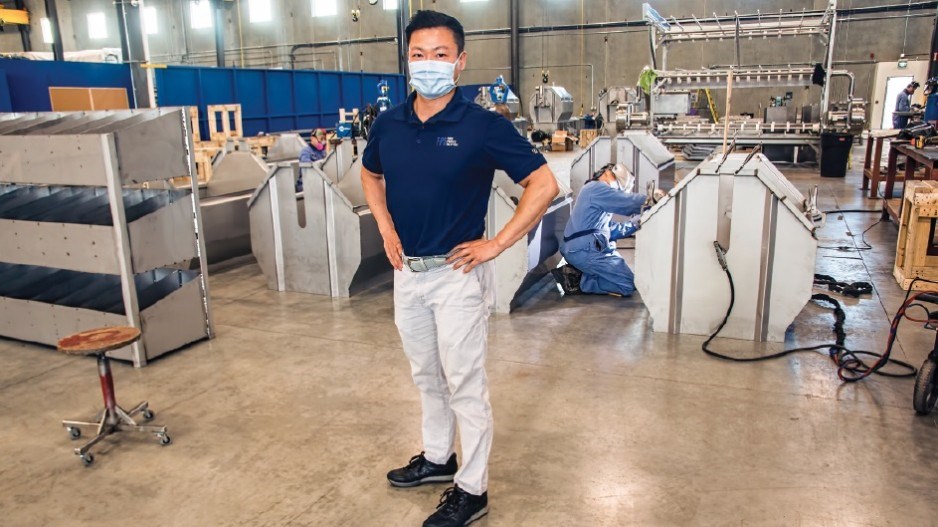A common misconception about B.C.’s manufacturing sector that Andrew Wynn-Williams would love to dispel is the notion that robots are destined to replace human employees.
“We don’t have enough people anyway,” said the Canadian Manufacturers & Exporters’ (CME) vice-president for B.C. “It doesn’t mean less jobs. It doesn’t mean lower wages. It’s the reverse.”
But amid record-high job vacancies in the province – B.C. is No. 1 in Canada at 7.4% – and increased global competition in the wake of supply chain issues brought on by the pandemic, West Coast manufacturers find themselves under increased pressure to invest in advanced manufacturing that melds automation and artificial intelligence (AI) for more efficient processes.
It’s particularly challenging for B.C. firms, according to Wynn-Williams, because most West Coast manufacturers are classified as small businesses. That means they have less capital to invest in the Fourth Industrial Revolution (Industry 4.0) than manufacturing giants based in Central Canada or overseas.
Industry 4.0 differs from earlier industrial revolutions that came about through advances in water power, electrical and digital-based technologies.
Industry 4.0 involves more advanced integrations between AI, automation and the Internet of Things to increase manufacturing efficiency.
For example, sensors on factory floors may be able to better monitor the manufacturing process and interact with AI-powered software to inform managers about potential supply chain issues.
Anything from gluing protective sleeves onto coffee cups to facilitating the manufacturing of stem cells within the biotech sector suddenly becomes more efficient and predictable.
The B.C. manufacturing sector is home to 11,000 small and medium-sized enterprises (SMEs) contributing $17 billion to the economy each year, according to the province.
Last year, Victoria earmarked $10 million for such SMEs applying for the Accelerating Manufacturing Scale-Up Grant program. The grant program was launched to help B.C. manufacturers adjust to changes brought on by the pandemic as supply chain disruptions left many domestic firms without access to necessary components.
“It’s a great first step, but a good piece of manufacturing equipment is going to cost you $1 million,” Wynn-Williams said, adding that significantly more capital will be needed for B.C.’s smaller manufacturers to make enough Industry 4.0 investments to be competitive.
A 2019 CME report found spending on machinery, equipment and intellectual property products in Canadian manufacturing was about 21% lower in 2017 compared with 2005.
“As a result, Canadian manufacturers, on average, lag their international counterparts when it comes to investing in new machinery, equipment and technologies. Data from the OECD [Organisation for Economic Co-operation and Development] suggest that we’re close to the bottom of advanced economies in terms of capital investment growth over the last five years,” the report stated.
“Canadian gross fixed capital formation [a component of GDP] has risen by 6% over the last five years. That’s well below the OECD average of 24.6%.”
The CME report noted that the U.S. growth rate of such investments was 26% while the EU’s was 30%.
Meanwhile, Richmond-based FPS Food Process Solutions Corp., known for its advanced manufacturing of freezing and cooling equipment, added another 80,000 square feet of factory space at the outset of the pandemic as access to food amid the supply chain squeeze became more important.
Justin Lai, vice-president of sales and marketing at FPS, told BIV the company did not have to lay off anyone at the outset of the pandemic and instead hired more workers as demand for food remained steady.
“When you invest in this kind of machinery and equipment, you don’t reduce the number of employees you have. In the long term, you hope to increase the number of employees you have,” said Wynn-Williams. “What it does do is it changes the profile of the people you’re hiring, so you need a higher-skilled workforce.”
Simon Fraser University is set to launch a new Master of Engineering program in the fall focused on developing more talent for Industry 4.0.
Edward Park, a mechatronic systems engineering professor, and his colleagues spoke to about 50 B.C. companies as they developed the new program that will be teaching about two-dozen candidates its first year.
“It’s [Industry 4.0] something they’d like to do, and it’s something they know that they must do down the road,” he said. “But they are having a difficult time in finding the right skills to provide the leadership or somebody with specific skills that may implement making that transformation.”
Park said COVID-19 further revealed vulnerabilities within B.C.’s manufacturing sector that still were not addressed by the time last year’s flood disaster deepened supply chain disruptions.
“We rely so much on manufacturing from China and other places, and the materials or the goods are not being supplied to us in time. By strengthening our manufacturing capabilities locally, we can address some of these issues that we’ve been seeing more recently.” •




